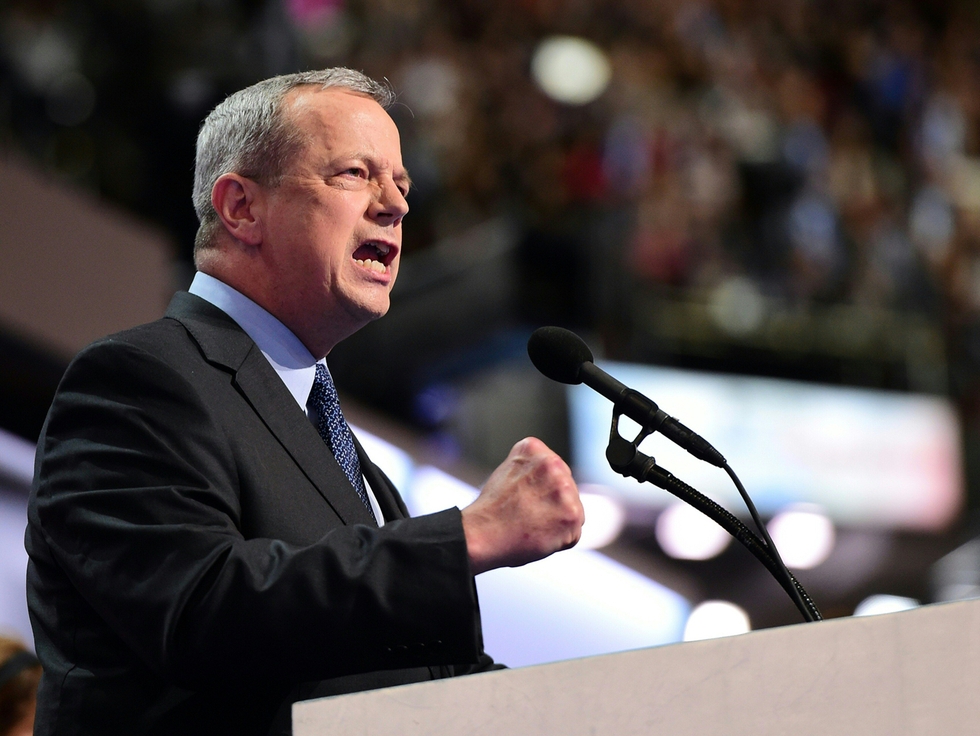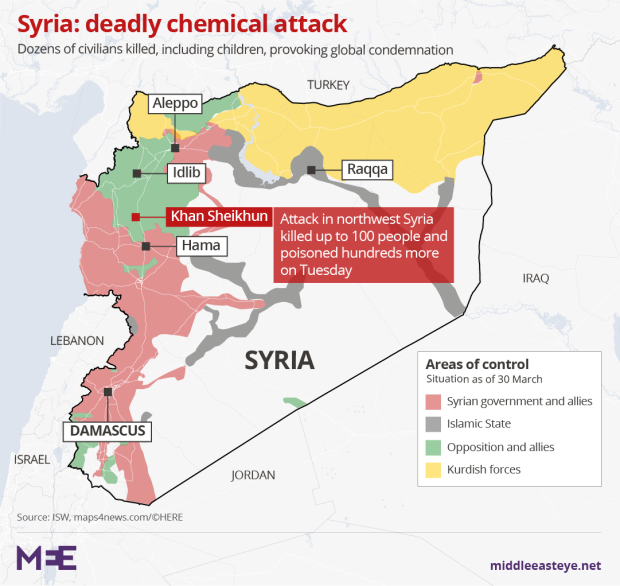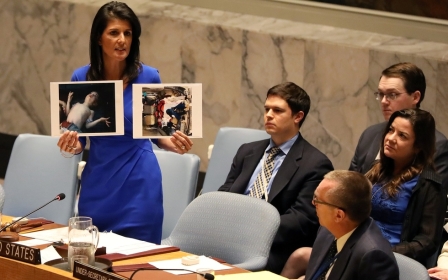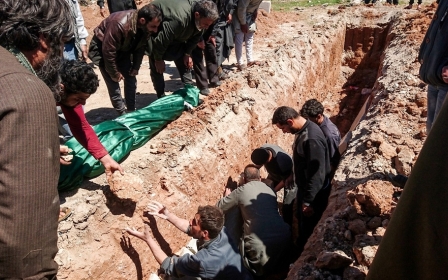EXCLUSIVE: Former US general calls for show of force after Syria attack

NEW YORK, United States – US President Donald Trump should answer a suspected chemical attack in Syria that left scores dead by grounding the country's air force, retired General John Allen told Middle East Eye on Wednesday.
Allen, former US President Barack Obama's envoy to the global coalition to counter the Islamic State (IS) group and a four-star Marine Corps general, said Syrian President Bashar al-Assad would continue gassing civilians "with impunity" without a tough US response.
"I think we're going to have to put the Syrian air force on the ground," Allen told MEE at an event in New York.
"Those elements that can deliver poison gas, whether it's off a barrel bomb, off a helicopter or fixed-wing tactical aviation. I think we're going to have to think very seriously about putting that air force on the ground where it can't get up in the air again."
Allen spoke with MEE as diplomats rowed in New York over an alleged chemical weapons attack in the early hours on Tuesday on a rebel-held town of Khan Sheikhun, in Idlib province, that left at least 72 people dead, including 20 children.
Dozens more were left gasping for air, convulsing and foaming at the mouth, according to doctors. It is thought to be the worst chemical weapons attack in Syria since 2013, when sarin gas was used. The Syrian military has denied responsibility.
"If Bashar al-Assad believes with impunity that he has the support of the Russians to drop VX [nerve agent] gas on unarmed civilians … that means he's going to use it over and over again," said Allen, now an analyst at the Brookings Institution think-tank.
"I think President Trump is confronted with a real moment right now. I think acting would set a condition in that conflict that no one would expect, and I think would change that conflict pretty dramatically."
Chemical attacks and the ‘red line'
Pentagon chiefs have long hatched plans to ground Assad's air force and halt civilian deaths. Allen was among those who criticised Obama for failing to enforce his own "red line" against Assad's government for using poison gas in Damascus in 2013.
Speaking earlier in Washington on Wednesday, Trump accused Assad's government of going "beyond a red line" with a poison gas attack on civilians, but he declined to spell out how or whether his administration would respond.
In his first extensive remarks on the latest alleged atrocity in Syria, Trump acknowledged at a joint news conference with Jordan's King Abdullah that he now had responsibility for policy there and said his views of Assad had changed.
"It crossed a lot of lines for me," Trump said of the attack, which he described as an affront to humanity. "That crosses many, many lines, beyond a red line," he said.
Western countries, including the US, have blamed Assad's armed forces for the worst chemical attack in Syria in more than four years. Russia, a military backer of Assad in the country's six-year-old civil war, asserted that the Syrian air force had struck a rebels weapon store, releasing the gas.
Trump, a Republican, criticised Obama for not following through on his threat to intervene if chemical weapons were used in Syria. Obama had squandered a "great opportunity" to solve the crisis by failing to uphold his "red line," said Trump.
"I think that set us back a long ways, not only in Syria but in many other parts of the world, because it was a blank threat," Trump said. "It is now my responsibility. It was a great opportunity missed."
‘You'll see'
Asked during an earlier Oval Office meeting with Abdullah if he was formulating a new policy toward Syria, Trump told reporters: "You'll see." His comments came just a few days after US statements suggesting a focus on stopping IS militants rather than ousting Assad.
Trump campaigned in the 2016 election on a promise to put America first in foreign policy, including by tightening rules on refugees. On Wednesday, in addition to hardening his language on Assad, he softened his remarks about those who were displaced by the war.
Secretary of State Rex Tillerson said it was time for Russia to think carefully about its support for Assad.
"We think that it is time that the Russians really need to think carefully about their continued support of the Assad regime," Tillerson told reporters.
Last month, US-led coalition aircraft dropped fighters for the first time into an area near the Syrian city of Raqqa to retake IS territory in a mission that included Apache helicopters, US Marine Corps artillery and special operations troops.
The campaign to capture Raqqa appears to be gathering pace as an overlapping, US-backed effort in Iraq is drawing closer to driving IS from Mosul.
In New York, Nikki Haley, US Ambassador to the United Nations, warned that Washington could take unilateral action if the UN Security Council did not respond firmly to the suspected chemical attack.
"When the United Nations consistently fails in its duty to act collectively, there are times in the life of states that we are compelled to take our own action," Haley said, without elaborating.
Britain, France and the United States, which holds the council presidency in April, have presented a draft resolution demanding a full investigation of the attack. Russia said the text was "categorically unacceptable".
Negotiations continued on the proposed measure throughout most of the day. Diplomats said it could come up for a vote at the council as early as Thursday.
Middle East Eye propose une couverture et une analyse indépendantes et incomparables du Moyen-Orient, de l’Afrique du Nord et d’autres régions du monde. Pour en savoir plus sur la reprise de ce contenu et les frais qui s’appliquent, veuillez remplir ce formulaire [en anglais]. Pour en savoir plus sur MEE, cliquez ici [en anglais].





